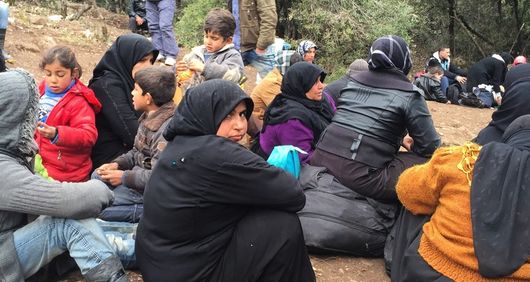Syrians at risk of deportation from Turkey

Syrian refugees are still at risk of deportation from Turkey, and the Turkish authorities may implement plans to force large numbers of them to a so-called “safe zone” in northern Syria. This is an active conflict zone, as evidenced by Turkey’s own recent military action in the north-eastern part of the country in October 2019.
Turkish authorities move forward with plans to force a large number of Syrian refugees to a so-called “safe zone” in northern Syria. The alleged safe zone is an active conflict zone, where Turkey itself has taken military action. Turkey was part of “Operation Euphrates Shield” in northern Aleppo province in 2016, as well as “Operation Olive Branch” in Afrin province in the beginning of 2018. On 9 October 2019, Turkey launched “Operation Peace Spring” in north-eastern Syria.
The UN reported on 15 October 2019, that in the previous six days alone, over 160,000 people in north-eastern Syria had been displaced, fleeing military advances and hostilities. Amnesty International documented summary killings – a summary killing or execution is an execution in which a person is accused of a crime and killed immediately, without a full and fair trial – and unlawful attacks carried out by Turkish forces and a coalition of Turkey-backed Syrian armed groups.
In September 2019 the situation in Idlib province in north-western Syria was described by aid groups as a “humanitarian nightmare”. More than three million Syrians have fled to Idlib from other parts of the country. Amnesty International documented multiple unlawful attacks on Idlib by the Syrian government, supported by Russia, on hospitals, schools, bakeries, and residential homes between January and June 2019.
Currently, all deportations to Syria are illegal, because of the nature and severity of the human rights risks there. Turkish authorities deny that anyone is returned to Syria against their will; claiming instead that 365,000 Syrians have voluntarily returned to what is one of the world’s most dangerous countries.
Why are refugees unsafe in Turkey?
In a brief Amnesty International published on 25 October 2019 it was shown that it is likely that hundreds of Syrian refugees across Turkey were apprehended, detained, and deported against their will in mid-2019. This usually occurred after being coerced or misled into signing so-called “voluntary return” documents. These documents are sometimes written only in Turkish, leaving many Syrian refugees unable to fully understand what they have signed.
Amnesty International and other organisations have received credible and consistent evidence of deportations of refugees and asylum seekers to Syria between 2014 and 2018, with the most recent reports taking place in mid-2019. Refoulement – or deporting someone despite a risk of serious human rights violations – is prohibited under both Turkish law and international laws, which Turkey has agreed to.
Upon their deportation to Syria, their Temporary Protection identification documents are cancelled. Those who manage to re-enter the country – virtually always irregularly, since the border is effectively closed – are left without any legal status or access to essential services and are particularly vulnerable to deportation or re-deportation.
It appears impossible to renew these documents after they are cancelled, even though renewal is allowed under Turkish law. Syrian refugees are often left without legal recourse or remedy to protect themselves against being deported.
Some people do return to Syria on a voluntary basis to do things like bring back elderly relatives or renew passports. These people have told Amnesty that they were not informed of the consequences of leaving Turkey and when they re-entered, they found their Temporary Protection status had been cancelled.
Scope of the refugee situation in Turkey
Turkey is the world’s largest host of refugees, presently hosting about four million, with most of them (over 3.6 million) coming from Syria. In theory, all Syrians in Turkey are granted Temporary Protection status, but they must first register and receive ID documents in order to access essential services, including healthcare and education. Turkey has spent billions of Euros hosting this population, with some financial support from the European Union (EU).
Istanbul is host to over 500,000 registered Syrians, as well as many thousands of others who are unregistered or registered in another province. Although no Syrian refugees are fully protected against refoulement, those who appear particularly vulnerable are those without ID documents, people outside their province of registration, and people working without permits. By the end of 2018, only about 68,000 such permits had been granted, leaving most Syrian refugees to seek work without a permit.
The civil war that has wrecked Syria since 2011 has caused incalculable destruction and driven millions of women, men and children from their homes. Of those, 5.6 million have fled the country, while over six million people are displaced within Syria.
- Downloads
- Download UA in PDF
- Download UA in Word